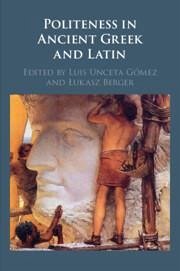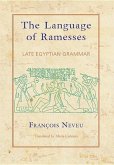Politeness in Ancient Greek and Latin
Herausgeber: Unceta Gómez, Luis; Berger, Lukasz
Politeness in Ancient Greek and Latin
Herausgeber: Unceta Gómez, Luis; Berger, Lukasz
- Broschiertes Buch
- Merkliste
- Auf die Merkliste
- Bewerten Bewerten
- Teilen
- Produkt teilen
- Produkterinnerung
- Produkterinnerung
Contributions based on papers presented at the conference Approaches to Greek and Latin im/politeness held at the Universidad Autâonoma de Madrid in June 2017.
Andere Kunden interessierten sich auch für
![Orthographic Traditions and the Sub-elite in the Roman Empire Orthographic Traditions and the Sub-elite in the Roman Empire]() Nicholas ZairOrthographic Traditions and the Sub-elite in the Roman Empire43,99 €
Nicholas ZairOrthographic Traditions and the Sub-elite in the Roman Empire43,99 €![The New Documents in Mycenaean Greek 2 Volume Hardback Set The New Documents in Mycenaean Greek 2 Volume Hardback Set]() The New Documents in Mycenaean Greek 2 Volume Hardback Set276,99 €
The New Documents in Mycenaean Greek 2 Volume Hardback Set276,99 €![New Testament Greek New Testament Greek]() B. H. McLeanNew Testament Greek36,99 €
B. H. McLeanNew Testament Greek36,99 €![The Colloquia of the Hermeneumata Pseudodositheana 2 Volume Set The Colloquia of the Hermeneumata Pseudodositheana 2 Volume Set]() The Colloquia of the Hermeneumata Pseudodositheana 2 Volume Set327,99 €
The Colloquia of the Hermeneumata Pseudodositheana 2 Volume Set327,99 €![The Language of Ramesses The Language of Ramesses]() Francois NeveuThe Language of Ramesses42,99 €
Francois NeveuThe Language of Ramesses42,99 €![An English to Akkadian Companion to the Assyrian Dictionaries An English to Akkadian Companion to the Assyrian Dictionaries]() Mark E CohenAn English to Akkadian Companion to the Assyrian Dictionaries54,99 €
Mark E CohenAn English to Akkadian Companion to the Assyrian Dictionaries54,99 €![The Great Cylinder Inscriptions A & B of Judea, Part I Text and Sign-Lift The Great Cylinder Inscriptions A & B of Judea, Part I Text and Sign-Lift]() Ira Maurice PriceThe Great Cylinder Inscriptions A & B of Judea, Part I Text and Sign-Lift21,99 €
Ira Maurice PriceThe Great Cylinder Inscriptions A & B of Judea, Part I Text and Sign-Lift21,99 €-
-
-
Contributions based on papers presented at the conference Approaches to Greek and Latin im/politeness held at the Universidad Autâonoma de Madrid in June 2017.
Hinweis: Dieser Artikel kann nur an eine deutsche Lieferadresse ausgeliefert werden.
Hinweis: Dieser Artikel kann nur an eine deutsche Lieferadresse ausgeliefert werden.
Produktdetails
- Produktdetails
- Verlag: Cambridge University Press
- Seitenzahl: 424
- Erscheinungstermin: 21. Dezember 2023
- Englisch
- Abmessung: 229mm x 152mm x 22mm
- Gewicht: 567g
- ISBN-13: 9781009124164
- ISBN-10: 1009124161
- Artikelnr.: 69074827
- Herstellerkennzeichnung
- Libri GmbH
- Europaallee 1
- 36244 Bad Hersfeld
- gpsr@libri.de
- Verlag: Cambridge University Press
- Seitenzahl: 424
- Erscheinungstermin: 21. Dezember 2023
- Englisch
- Abmessung: 229mm x 152mm x 22mm
- Gewicht: 567g
- ISBN-13: 9781009124164
- ISBN-10: 1009124161
- Artikelnr.: 69074827
- Herstellerkennzeichnung
- Libri GmbH
- Europaallee 1
- 36244 Bad Hersfeld
- gpsr@libri.de
Part I. Introduction: 1. Im/Politeness Research in Ancient Greek and Latin: Concepts, Methods, Data Luis Unceta Gómez and
ukasz Berger; Part II. The Expression of Im/Politeness: 2. Towards a Comparison of Greek and Roman Politeness Systems Peter Barrios-Lech; 3. How to Be Polite without Saying 'Please' in Classical Greek? The Role of
in Polite Requests Camille Denizot; 4. Text as Interaction: ut mihi (quidem) uidetur as a Hedging Device in Latin Literary Texts Francesca Mencacci; 5. Politeness Formulae in Roman Non-Literary Sources: The Case of Juridical Texts Rolando Ferri; Part III. Im/Politeness in Use: 6. Friendship Terms in Plato Michael Lloyd; 7. Conversational Openings and Politeness in Menander. An Integrated Pragmatic Approach to Menandrean Dialogue Giada Sorrentino; 8. Im/politeness of Interruptions in Roman Comedy
ukasz Berger; 9. Im/Politeness and Conversation Analysis in Greek Tragedy: The Case of Theseus and the Herald in Euripides' Supplices Evert Van Emde Boas; 10. Qui honoris causa nominatur. Form and Function of Third-Party Politeness in Cicero Lidewij Van Gils and Rodie Risselada; 11. Banter, Teasing and Politeness in Varro's De re rustica Jon Hall; Part IV. Ancient Perceptions on Im/Politeness: 12. Being Polite the Roman Way. Comments about Im/Politeness in the Comedies of Plautus and Terence Luis Unceta Gómez; 13. Impoliteness outside Literature: The Colloquium Harleianum Federica Iurescia; 14. Politeness in Ancient Scholarship Anna Zago.
ukasz Berger; Part II. The Expression of Im/Politeness: 2. Towards a Comparison of Greek and Roman Politeness Systems Peter Barrios-Lech; 3. How to Be Polite without Saying 'Please' in Classical Greek? The Role of
in Polite Requests Camille Denizot; 4. Text as Interaction: ut mihi (quidem) uidetur as a Hedging Device in Latin Literary Texts Francesca Mencacci; 5. Politeness Formulae in Roman Non-Literary Sources: The Case of Juridical Texts Rolando Ferri; Part III. Im/Politeness in Use: 6. Friendship Terms in Plato Michael Lloyd; 7. Conversational Openings and Politeness in Menander. An Integrated Pragmatic Approach to Menandrean Dialogue Giada Sorrentino; 8. Im/politeness of Interruptions in Roman Comedy
ukasz Berger; 9. Im/Politeness and Conversation Analysis in Greek Tragedy: The Case of Theseus and the Herald in Euripides' Supplices Evert Van Emde Boas; 10. Qui honoris causa nominatur. Form and Function of Third-Party Politeness in Cicero Lidewij Van Gils and Rodie Risselada; 11. Banter, Teasing and Politeness in Varro's De re rustica Jon Hall; Part IV. Ancient Perceptions on Im/Politeness: 12. Being Polite the Roman Way. Comments about Im/Politeness in the Comedies of Plautus and Terence Luis Unceta Gómez; 13. Impoliteness outside Literature: The Colloquium Harleianum Federica Iurescia; 14. Politeness in Ancient Scholarship Anna Zago.
Part I. Introduction: 1. Im/Politeness Research in Ancient Greek and Latin: Concepts, Methods, Data Luis Unceta Gómez and
ukasz Berger; Part II. The Expression of Im/Politeness: 2. Towards a Comparison of Greek and Roman Politeness Systems Peter Barrios-Lech; 3. How to Be Polite without Saying 'Please' in Classical Greek? The Role of
in Polite Requests Camille Denizot; 4. Text as Interaction: ut mihi (quidem) uidetur as a Hedging Device in Latin Literary Texts Francesca Mencacci; 5. Politeness Formulae in Roman Non-Literary Sources: The Case of Juridical Texts Rolando Ferri; Part III. Im/Politeness in Use: 6. Friendship Terms in Plato Michael Lloyd; 7. Conversational Openings and Politeness in Menander. An Integrated Pragmatic Approach to Menandrean Dialogue Giada Sorrentino; 8. Im/politeness of Interruptions in Roman Comedy
ukasz Berger; 9. Im/Politeness and Conversation Analysis in Greek Tragedy: The Case of Theseus and the Herald in Euripides' Supplices Evert Van Emde Boas; 10. Qui honoris causa nominatur. Form and Function of Third-Party Politeness in Cicero Lidewij Van Gils and Rodie Risselada; 11. Banter, Teasing and Politeness in Varro's De re rustica Jon Hall; Part IV. Ancient Perceptions on Im/Politeness: 12. Being Polite the Roman Way. Comments about Im/Politeness in the Comedies of Plautus and Terence Luis Unceta Gómez; 13. Impoliteness outside Literature: The Colloquium Harleianum Federica Iurescia; 14. Politeness in Ancient Scholarship Anna Zago.
ukasz Berger; Part II. The Expression of Im/Politeness: 2. Towards a Comparison of Greek and Roman Politeness Systems Peter Barrios-Lech; 3. How to Be Polite without Saying 'Please' in Classical Greek? The Role of
in Polite Requests Camille Denizot; 4. Text as Interaction: ut mihi (quidem) uidetur as a Hedging Device in Latin Literary Texts Francesca Mencacci; 5. Politeness Formulae in Roman Non-Literary Sources: The Case of Juridical Texts Rolando Ferri; Part III. Im/Politeness in Use: 6. Friendship Terms in Plato Michael Lloyd; 7. Conversational Openings and Politeness in Menander. An Integrated Pragmatic Approach to Menandrean Dialogue Giada Sorrentino; 8. Im/politeness of Interruptions in Roman Comedy
ukasz Berger; 9. Im/Politeness and Conversation Analysis in Greek Tragedy: The Case of Theseus and the Herald in Euripides' Supplices Evert Van Emde Boas; 10. Qui honoris causa nominatur. Form and Function of Third-Party Politeness in Cicero Lidewij Van Gils and Rodie Risselada; 11. Banter, Teasing and Politeness in Varro's De re rustica Jon Hall; Part IV. Ancient Perceptions on Im/Politeness: 12. Being Polite the Roman Way. Comments about Im/Politeness in the Comedies of Plautus and Terence Luis Unceta Gómez; 13. Impoliteness outside Literature: The Colloquium Harleianum Federica Iurescia; 14. Politeness in Ancient Scholarship Anna Zago.








